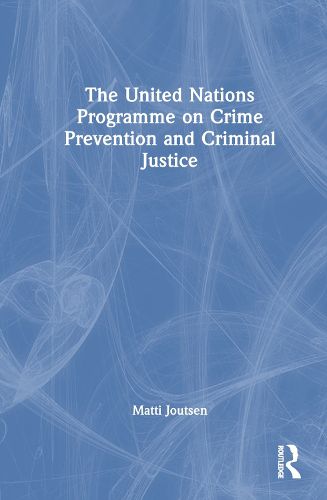Readings Newsletter
Become a Readings Member to make your shopping experience even easier.
Sign in or sign up for free!
You’re not far away from qualifying for FREE standard shipping within Australia
You’ve qualified for FREE standard shipping within Australia
The cart is loading…






This book documents the evolution of the United Nations (UN) Crime Programme and its changing priorities, from the early focus on juvenile delinquency and correctional treatment, to the present preoccupation with transnational organized crime. It analyses what factors have contributed to this evolution, and to the shift from the original work on "soft law" resolutions and international standards, to "hard law" conventions, and to the expansion of technical assistance. It also examines the changing structure and working methods of the Programme, such as the UN Crime Commission and the UN Secretariat unit responsible for the Programme, the UN Crime Congresses, and the Programme Network Institutes. Drawing on almost 50 years of experience on the "inside" of the UN Crime Programme and his hands-on knowledge of the working of governmental and intergovernmental processes, Matti Joutsen explores the transitions that have taken place in the UN Crime Programme over the seven decades of its existence, assesses the changing impact of the Programme, and suggests possible future directions in international cooperation in crime prevention and criminal justice.
An accessible and compelling read, this book will appeal to students and scholars of criminology, sociology, politics, criminal justice, policy makers, and those interested in the evolution of the UN Crime Programme.
$9.00 standard shipping within Australia
FREE standard shipping within Australia for orders over $100.00
Express & International shipping calculated at checkout
This book documents the evolution of the United Nations (UN) Crime Programme and its changing priorities, from the early focus on juvenile delinquency and correctional treatment, to the present preoccupation with transnational organized crime. It analyses what factors have contributed to this evolution, and to the shift from the original work on "soft law" resolutions and international standards, to "hard law" conventions, and to the expansion of technical assistance. It also examines the changing structure and working methods of the Programme, such as the UN Crime Commission and the UN Secretariat unit responsible for the Programme, the UN Crime Congresses, and the Programme Network Institutes. Drawing on almost 50 years of experience on the "inside" of the UN Crime Programme and his hands-on knowledge of the working of governmental and intergovernmental processes, Matti Joutsen explores the transitions that have taken place in the UN Crime Programme over the seven decades of its existence, assesses the changing impact of the Programme, and suggests possible future directions in international cooperation in crime prevention and criminal justice.
An accessible and compelling read, this book will appeal to students and scholars of criminology, sociology, politics, criminal justice, policy makers, and those interested in the evolution of the UN Crime Programme.